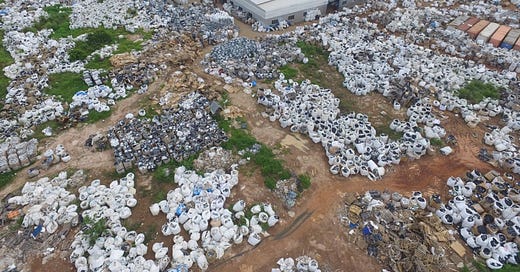The West’s Environmental Crisis Migrates From China Elsewhere
A pastoral Thai province is the victim, but not the only one
By: Arm Punyathorn
Thailand’s eastern province of Chachoengsao is the site of an emerging crisis of toxic waste and dirty recycling. In the past a place of great biodiversity, the province is being inundated with recycling waste that is choking rivers and fouling the air, the product of a 2017 decision by Beijing to ban the recycling of imported waste, which had grown into a major industry until the government no longer wanted to clean up much of the mess generated overseas. But waste has to go somewhere. China’s ban led to the diversion of large streams of waste exports towards neighboring Southeast Asia.
Much of the developed world’s green success, such as it is, thus relies on putting waste on cargo ships and sailing it over the horizon to be forgotten. Chachoengsao, once a bucolic area of great beauty, is one of the dubious beneficiaries of that policy. The Bang Pakong River, one of Thailand’s four major waterways, underlies the province’s sprawling ecosystem. The province was even nicknamed “Pad Riew” or “Eight Rows,” referring to the fact that fishermen were able to catch eight rows of fish in the area. The province is also the site of many organic farms, which grow mangoes, mushrooms, and rice. Some of these products are exported abroad, to places like Europe.
With enough of a tip of the province abutting the Gulf of Thailand to allow for the arrival of waste-laden freighters, and with a poverty-stricken rural population willing to do the dirty work of separating toxic waste, it has particularly become the home of facilities recycling e-waste, some of the planet’s most dangerous garbage because of the presence of highly polluting heavy metals. That is despite a 2018 Thai government edict banning imports of foreign electronic waste. Nonetheless, since China’s e-waste ban, 28 new recycling factories have appeared, particularly in the Ko Khanun Subdistrict of Phanom Sarakham District. In 2019, according to published reports, 14 businesses in Chachoengsao were granted licenses to process electronic waste, six of them in Ko Khanun.



